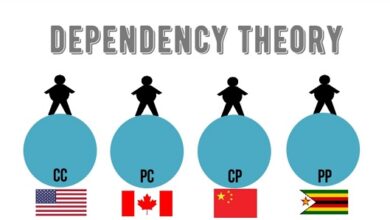What is prosocial behavior and how does it develop
If the human being has become such a specific species, it is partly because he has managed to create great social fabrics of mutual care and transmission of knowledge. That is, it is very likely that we relate to each other in many different ways, a trend that can be summed up in one concept: prosocial behavior .
Next, we will see what exactly prosocial behavior is, how it is expressed and what relationship it has to the phenomena of empathy and cooperation .
What is prosocial behavior?
Although there is no universal definition of the concept of prosocial behavior, there is a high consensus in defining it as a repertoire of social and positive behaviors.
Due to differences in criteria regarding the inclusion of the motivational factor in the definition, the authors consider that there are two types of positive social behaviors: behaviors that report a benefit to both parties involved and behaviors that only benefit one of the parties.
A proposed definition that integrates behavioral and motivational aspects states that all positive social behavior is performed to benefit another in the presence (or not) of altruistic motivation, such as giving, helping, cooperating, sharing, comforting, etc. For his part, Strayer proposes a classification of four types of activities to clarify the phenomenon of prosocial behavior:
- Activities of donating, sharing, exchanging or altering objects with others.
- Cooperation activities .
- Tasks and Help Games .
- Empathic activities towards the other.
In response to this proposal, in prosocial behavior the benefit lies with the other person, while in cooperative behavior both parties coordinate to obtain a mutual benefit. Now, determining how much each party earns is a challenge for psychology and the behavioral sciences in general. After all, the willingness to help someone and the satisfaction of having done so are factors that tell us about a reward for the altruistic individual.
The research carried out on the subject
Prosocial behavior is a recent concept in the field of psychopedagogy . However, the biggest research boom in this field of knowledge corresponds to the final phase of the last century. From that point on, it was studied more widely how this phenomenon influences the emotional well-being of the individual (obtaining an intensely positive correlation between the two) and what methodology should be followed to implement programs that improve this type of beneficial functioning in the child population.
Thus, it seems that during the socio-emotional development of the human being, more incidence can result in the promotion of pro-social behaviors, that is, in the internalization of a set of values such as dialogue, tolerance, equality or solidarity that are behaviorally reflected from acts such as helping the other, respect and acceptance of the other, cooperation, comfort or generosity in sharing a certain object.
Prosocial behavior of learning theories
One of the main explanations of the concept of prosocial behavior has been proposed by theories of learning , although there are also other theoretical models, such as the ethological and sociobiological perspective, the cognitive-evolutionary approach or the psychoanalytic perspective.
Theories of learning, of high empirical consideration, argue that prosocial behavior derives from the influence of external or environmental factors . Thus, this type of behavior is learned through procedures such as classical and operant conditioning, from which actions emitted with stimuli and pleasant consequences for the individual (positive reinforcement) are associated and, therefore, tend to be repeated in the future. More often, the type of reinforcement provided is social (a gesture, a smile, a show of affection) rather than material.
The fact of receiving an affective reward, according to the research carried out, seems to encourage in the individual the desire to emit a helping behavior to the other. That is, there is an internal motivation to perform this behavior, as opposed to what happens when the reward is material, where the behavior is performed to obtain that specific reward.
On the other hand, other studies propose the relevance of observational learning due to the imitation of prosocial models. Some authors highlight a greater influence of internal factors, such as cognitive styles used in moral reasoning, while others emphasize that external factors (socializing agents – family and school – and environment) are modified until they become internal controls through internalization of behavior regulation. of a person (Bandura, 1977 and 1987).
These contributions are classified in the interactionist perspectives, as they consider the individual’s interaction with the situation as a determining factor of behavior .
Empathy, an essential component
The ability to empathize is one of the factors that cause prosocial behavior, although research should shed more light on the concrete relationship between the two phenomena.
Some proposals defend the definition of empathy as an interactive process between emotional, motivational and cognitive aspects that occur during different stages of development. Empathy has a character mainly learned through modeling processes and is defined as an affective response emitted after awareness of understanding the experience of the situation and the feelings or perceptions that the other is receiving. This skill can be learned by understanding the meaning of certain non-verbal cues, such as facial expression, that indicate the emotional state of the subject in question.
Some authors have focused their studies on the differentiation between situational empathy and dispositional empathy, which refers to the tendency of some personality types to be more sensitive to empathic manifestations. This last distinction was taken as a key aspect to study the nature of prosocial behavior, finding a high correlation between a high empathic predisposition and a greater emission of prosocial behavior.
The facets of empathy
Empathic capacity can be understood from three different perspectives . Considering each of them, the mediating role of this phenomenon can be differentiated in terms of prosocial behavior: empathy as affect, as a cognitive process or as a result of the interaction between the first two.
The results show that the first case is more related to the helping behavior of the other, although it was not concluded that it is a causal factor, but a mediator. Thus, the level of dispositional empathy, the bond established with the mother figure, the type of concrete situation in which empathic behavior occurs, the age of the children (in preschoolers the association between empathy and behavior) also plays an important role. prosocial is weaker than in older children), the intensity and nature of arousal, etc.
Even so, it seems clear that implementing empathy training programs during the development of children and young people can be a factor in protecting personal and social well-being in the future.
cooperation vs. Competition in socio-emotional development
It is also the learning theories that, in the last century, gave more emphasis to the definition of the relationship between the manifestation of cooperative behavior vs. competitive in relation to the type of psychological and social development experienced by people exposed to one or another model.
By cooperative behavior we mean the set of behaviors that are expressed in a given situation when engaged in working towards the shared priority of group goals, this point acting as a prerequisite for achieving the individual goal. On the contrary, in the competitive situation, each individual is oriented towards achieving his own goals and prevents others from having the possibility of achieving them.
Research carried out by Deutsch at MIT found greater communicative efficiency, more communicative interactions in relation to the proposal of their own ideas and acceptance of other people , greater level of effort and coordination in the tasks to be performed, greater productivity and greater confidence in the contributions of the members of the group in cooperative rather than competitive groups.
In other later works, although without an empirically proven validation that allows a generalization of the results, individuals with characteristic cooperative behaviors were associated with a greater interdependence for the achievement of objectives, more helping behaviors are given between the different subjects , greater frequency in satisfaction of mutual needs and a greater proportion of positive evaluations of the other and greater promotion of the behavior of others.
Cooperation and social cohesion
On the other hand, Grossack concluded that cooperation is positively related to greater group cohesion , greater uniformity and quality of communications among members, similar to what Deutsch pointed out.
Sherif confirmed that communicative guidelines are more honest in cooperative groups, that there is an increase in mutual trust and favorable disposition among different group members, in addition to a greater likelihood of normative organization. Finally, there was a greater power of cooperative situations to reduce intergroup conflict situations. Later, other authors associated the appearance of feelings of counter-empathy, higher levels of anxiety and lower levels of tolerant behavior in competitive school groups.
cooperation in education
In the educational field, the multiple positive effects derived from the use of methodologies that encourage cooperative work were evidenced, in addition to promoting greater academic performance (in skills such as assimilation of concepts, problem solving or the elaboration of cognitive products, mathematics). and self-esteem, better predisposition to learn, greater intrinsic motivation and a more effective performance of certain social skills (understanding of others, helping behavior, sharing, respect, tolerance and concern among equals or a tendency to cooperate outside of learning situations ).
As conclusion
Throughout the text, the benefits obtained in the personal psychological state were verified when the learning of prosocial behavior during the developmental phase is enhanced. These competencies are critical as they help you connect with the rest of society and benefit from the perks of being an active member of society.
Thus, the advantages not only impact the optimization of the individual’s emotional state, but also the cooperative behavior associated with greater academic competence, where the assumption of cognitive skills is facilitated, such as reasoning and mastery of the instrumental knowledge covered during the school period.
It can be said, therefore, that the promotion of prosocial behavior becomes a great psychological protection factor for the subject in the future , making him/her individually and socially more competent, as maturation occurs in adulthood. Although it may seem paradoxical, growing up, maturing and gaining autonomy means knowing how to adapt to the rest and taking advantage of its protection in some ways.




